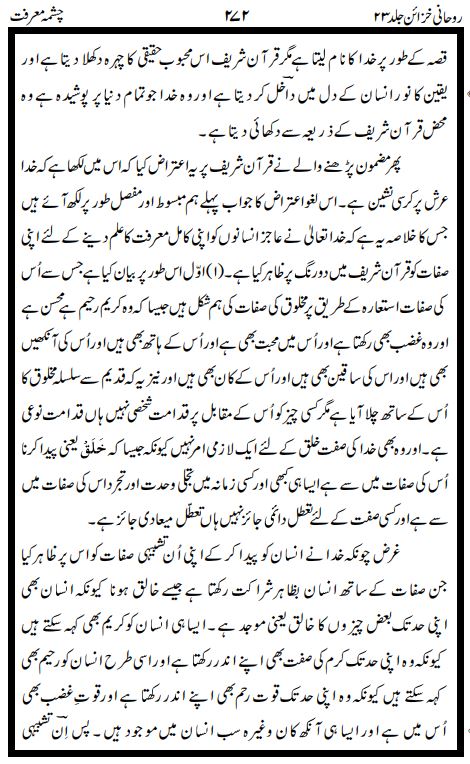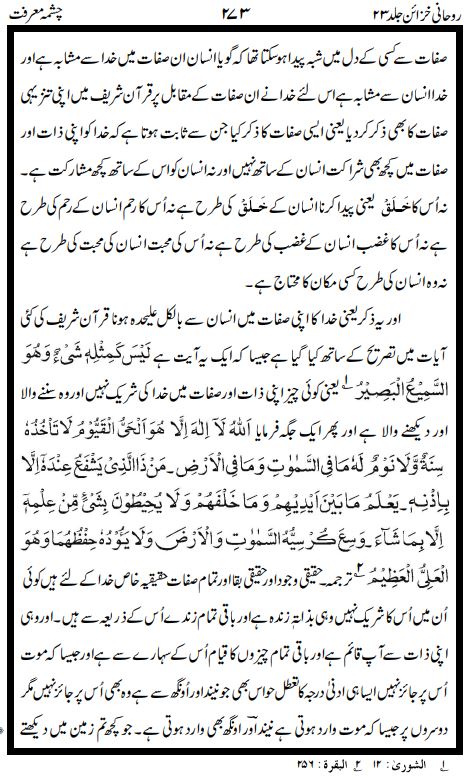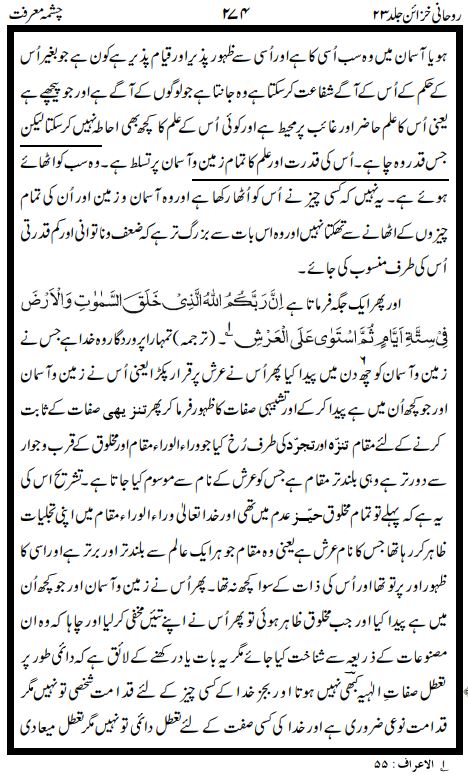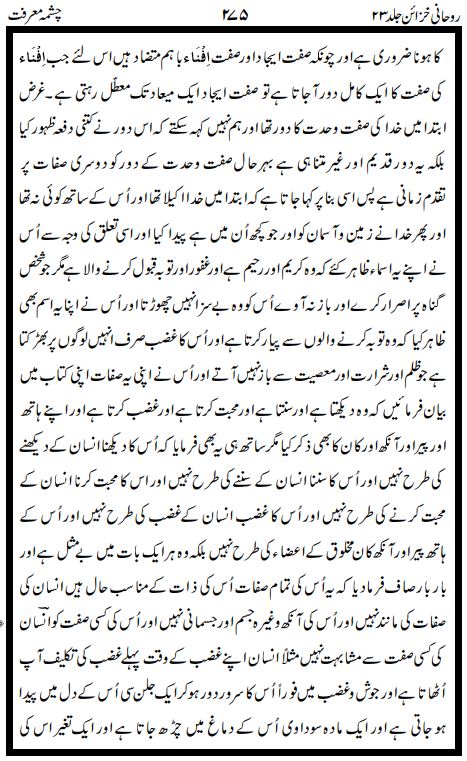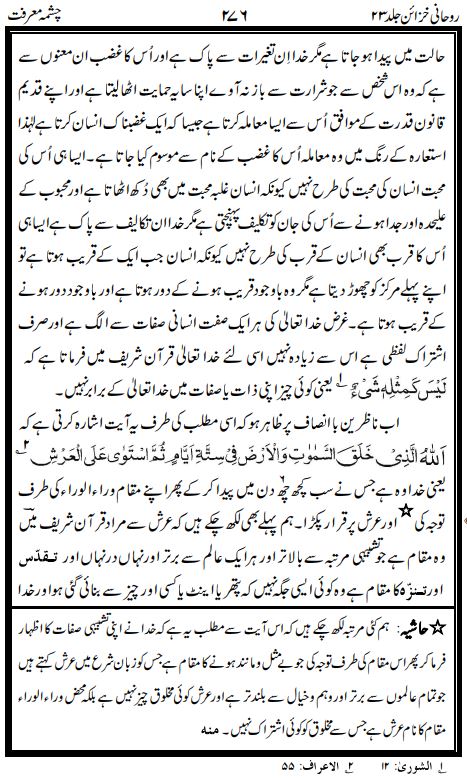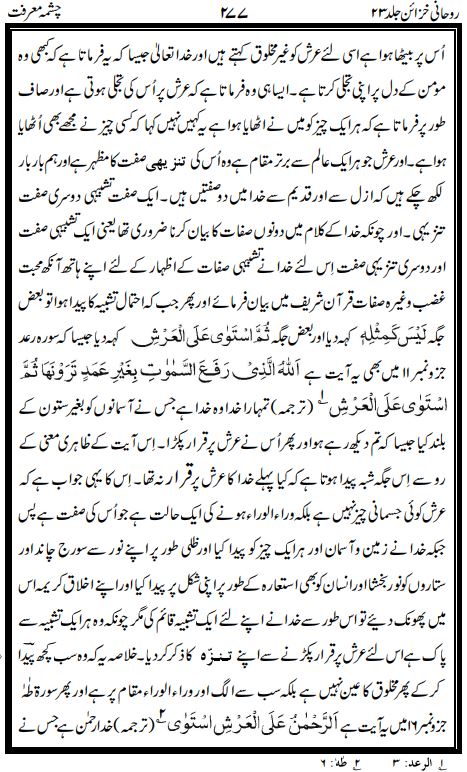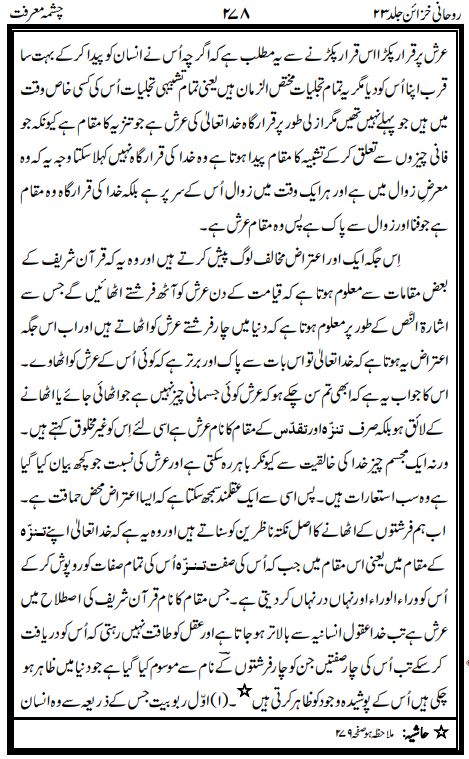The Promised Messiah a.s elaborates on the subject of two types of Divine attributes – immanent and transcendent.
Extracts from The Essence of Islam, Vol.I, pp. 55-60.
God Almighty, in order to bestow perfect understanding upon His humble creatures, has set out in the Holy Qur’an two aspects of His attributes. First, He has described His attributes metaphorically as resembling some human qualities. For instance, He is Noble, Merciful, and Beneficent. He can be angry as well as loving. He has hands and eyes, legs and ears. He has been creating throughout eternity, though nothing has been eternally co-existent with Him. However, species have long existed and even that is not essential for the operation of His attribute of creation, for though creation is one of His attributes, the manifestation of His Unity and Singleness at certain times is also a part of His attributes. None of His attributes falls into permanent disuse, but a temporary cessation of its operation is permissible.
Thus God manifested His attributes of resemblance to man. For instance, God is Creator, but to some degree, man also creates or fashions; and man can be called noble for, up to a point, he possesses the quality of nobility; and man can be called merciful for, up to a point, he possesses the quality of mercy. He also has the quality of anger; and he has eyes and ears, etc. This could create a suspicion in one’s mind that man resembles God in respect of these attributes, and God resembles man. Therefore, God, by contrast, has also mentioned in the Holy Qur’an His attributes of transcendence, i.e., such attributes of which man does not partake at all in his being or in his qualities. God’s creation is not like man’s creation, nor is God’s mercy like man’s mercy, nor is His wrath like man’s anger, nor is His love like man’s love, nor is He in need of space like man.
The Holy Qur’an sets out clearly that in His attributes God is quite distinct from man. For instance, it is said:
‘Nothing in essence shares its substance or attributes with God. He is All-Hearing, All-Seeing.’
At another place it is said:
‘True Being and True Existence and all true qualities belong only to God and that no one is an associate with Him in respect of them. He alone is alive in His Being and all others are alive through Him. He exists in His own Being and everything else exists through His support. As He is not subject to death so also He is not subject to even temporary cessation of His senses like sleep or slumber; but others are subject to death, sleep and slumber. All that you see in the heavens or in the earth belongs to Him and manifests itself and exists through Him. There is no one who can intercede with Him without His permission. He knows all that is before or behind people, that is, His knowledge comprises that which is manifest and that which is hidden. No one can encompass any part of His knowledge except that much which He permits. His power and His knowledge encompass the heavens and the earth. He supports all and nothing supports Him. He is not wearied by supporting the heavens and the earth. He is above all weakness and feebleness and lack of power.’
The Throne of Allah – His Station of Singleness and Transcendence
At another place it is said:
‘Your Lord is Allah, Who created the heavens and the earth in six periods and then settled Himself on the Throne.’
This means that having created the heavens and the earth and all that is in them and having manifested His attributes of resemblance, He then addressed Himself to His station of transcendence and aloneness, in order to demonstrate His attributes of transcendence which station is beyond of beyond and is farthest away from creation. That station which is the highest is called the Throne.
The explanation of this is that in the beginning all creation was nonexistent and God Almighty manifested Himself at a station which was beyond of beyond and is named the Throne, that is a station which is higher than and above all the worlds. There was nothing except His Being. Then He created the heavens and the earth and all that is in them. When creation came into being, He hid Himself and desired that He should be known through His creation.
It must be remembered that Divine attributes never fall into permanent disuse. Except God, no one enjoys eternal personal existence, but the permanence of species too is requisite. No Divine attribute falls into permanent disuse, but there is temporary disuse. As the attribute of creation and the attribute of destruction are inconsistent with each other, therefore, when the attribute of destruction comes into full operation, the attribute of creation falls into disuse for a period. In short, in the beginning it was the time of the operation of the Divine attribute of Singleness and we cannot say how often this period repeated itself, except that it is eternal and without limit. In any case, the attribute of Singleness has priority in time over other attributes. That is why it is said that to begin with, God was alone and that there was no one with Him. Then God created the heavens and earth and all that is in them and in that context He manifested His attributes that He is Noble, Merciful, Forgiving, and Acceptor of repentance. But he who persists in sin and does not desist is not left without chastisement. He also manifested His attribute that He loves those who repent, and His wrath overtakes only those who do not desist from wrongdoing and disobedience.
Nothing Approximates to the Attributes of Allah
All His attributes are appropriate to Him. They are not like human qualities. His eyes etc. are not physical and none of His attributes resembles human attributes. For instance, when a man is angry he suffers from anger himself and his heart loses its comfort and perceives a burning sensation and his brain is oppressed and he undergoes a change; but God is free from all such changes. His wrath means that He removes His support from one who does not desist from mischief and, according to His eternal law, He metes out to him such treatment as a human being metes out to another when he is angry. Metaphorically, it is called God’s wrath. In the same way, His love is not like the love of a human being, for a human being suffers in love also when he is separated from his beloved. But God is not subject to suffering. His nearness also is not like the nearness of a human being, for when a human being approaches near someone he vacates the space which he had occupied before. But God, despite being near is far, and despite being far is near. In short, every Divine attribute is distinct from human qualities. There is only a verbal resemblance and no more. That is why in the Holy Qur’an Allah the Exalted says: ‘Nothing approximates to God Almighty in its being or its qualities.’
—Chashma-e-Ma‘rifat, Ruhani Khaza’in, Vol. 23, pp. 272-276
